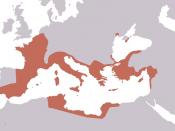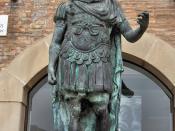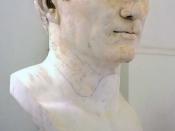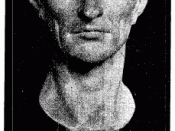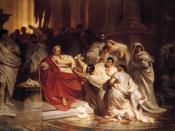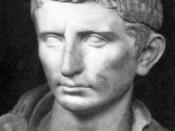Julius Caesar was known by Roman's to be a tall handsome, determined, and energetic man from a noble, and moderately wealthy family. He was also known to wear his clothing in a showy elegant way. More than the usual Italian, he went through much trouble in the arrangement of his hair. His impressive appearance was not where it stopped. He is without any contest the Roman Empires greatest politician and statesmen. 1 Julius Caesar was born in Rome to an aristocratic family on July 13th 100 B.C. The most important aspect of this child's upbringing is that he was able to move among all the layers of society. This gave him a good view all the classes of Roman life.
Caesar was in no way handed an easy life. He lost his father at the age of fifteen. He became very close to his mother, who took a firm command in his upbringing.
Another major figure in the raising of Caesar was his uncle Gaius Marius Cotta. 2 After Gaius was installed on January 1, 92 BC, Caesar was barley capable of any time with his family. As he grew older and wiser he began to advise men on legal, financial, and even private matters. Caesar gave promises to people of employment, shelter, relief from military employment and help with their debts to others.
As a young man he was faced with many Judicial activates. He soon became the head of many court proceedings. He quickly became versed in the way or Roman justice. It is important to recognize that this type or responsibility is simple awesome for a young adult being given this power in 84 BC. 3 The main point that Gaius stressed to the premature Caesar was that a senator's prime obligation was not to his family or clan but to his clients. This lesson stuck with him throughout his life. He was never a man that would neglect his duties to Rome. This to me is a very admirable trait for anyone. In this time holding to your duties secured the fabric of Roman life. 4 As Caesar continues to mature he becomes very recognized for his intelligence, variety of interests, and superb taste. It became very apparent that he was raised by a numerous amount role models that educated him. A powerful gift Caesar became know for was his ability as an orator. This ability proves to be very useful in his later life. 4 A major impact on the shaping of Julius Caesar will take place during the Roman Civil War. At only sixteen he is inside one of two parties. Because of his defiant loyalty he does not abandon it despite its apparent defeat. We can see that he was committed to a position within the Roman aristocracy. Despite that fact he was very emotionally shaken by this, it is recognized as a gradual starting point for his identity. 5 At sixteen holding his ground in this situation says much about his character. This integrity develops for the rest of his life. This impressive attribute will remain constant for this man. This incident will also play a crucial role on him taking a dictatorship over Rome.
What I found to be the most interesting of Caesar's traits was his interest in Public affairs. He put much effort into making public games. Much money was spent to provide recreation for the people of the Roman Empire. Because it sent him personally into debt he won much favorable public opinion.
This man had the two qualities that characterize a great statesman. The first is a quick grasp and prompt reaction to the circumstances he is faced with. This can serve the needs of the time by allowing to take account of existing trends with a clear head. 6 The second is creative political ability, which can lead the statesman's colleagues in a new direction and create new circumstances. Caesar lived in an age that was in need of both of them. He was able to discover the roots of Rome's problems as opposed to previous leaders that mealy attacked the symptoms. His main method was always being concerned about the reorganization of Rome. 7 For the first time Caesar was plotted against by a dissatisfied Roman politician. It was broken up and failed to even hurt his political interests. Caesar decided it was necessary at this point to ally himself with Marcus Crassus and Gnaeus Pompey. This political alliance held a very considerable power in Rome at the time Crassus was extremely wealthy and filled with political ambition. Pompay had returned from Asia Minor in 62 B.C. As a great military leader and an ideal in the eyes of the people. The three of them gained major victory when Caesar was elected a consul. In 59 B.C. Caesar took proconsul of three provinces north of Italy and married. This was the start of a more power hungry Caesar.
Despite he was trained to be a politician as opposed to a soldier he realized that military victories were needed to achieve a greater frame. He began a campaign to take over France, also known as Gaul. It was little shock when Caesar was known as a military Genius. Nine years were spent in France and only two battles were lost. He conquered a vast amount of territory and was even able to invade Britain.
Julius Caesar had never felt as powerful as he did at this point. It is believed that this marked a new stage of his identity. Many celebrations were held in Rome for his Victories. Pompay however was not rejoicing with Rome, he was becoming alarmed at his success. Because of his growing suspicion of Caesar he put him into an Alliance with conservatives.
The conservatives ordered him to give up his army. As we know about Caesar's personality he is not one to yield. He in no way was about to surrender his men and be left without any defenses. Caesar led an army of over five thousand across a stream the separated his providences from Italy. At this point there was no turning around the civil war that he had provoked.
Caesar moved south very quickly and encountered very little opposition. Pompay's troops surrendered and forced him to flee to the Balkans. All the conservatives that commanded him to give up his army fled with Pompay.
In two months time he became the complete controller of Italy. However it would take him five years to conquer Pompay and his followers. By 49 BC Caesar had appointed himself dictator and consul. He continued to chase Pompay into Egypt where he found that his enemy had been murdered.
He launched a few more campaigns that helped him win over the people even more. He won a war that gave Cleopatra the position of ruler of Egypt. He continued on to conquer northwestern Turkey. The people could not hear enough about his victories. Upon this he was pronounced the dictator of Rome for ten years and then for life.
The power he had won was used very wisely to make many important reforms. Much effort was put into controlling dishonesty among Roman and the provincial government. The man was even able to correct the calendar. He ended confusion that existed for hundreds of years in computing time.
Caesar had a very crafty idea to resolve his situations with his enemies. He decided that he was going to appoint them to public office. This plan of action is very interesting. The main idea thought at that time in Rome was to dispose of one's enemies. However, Caesar was smart enough to have them work for him, keep them near, and most importantly under control.
He also felt the need to improve the way of Roman life for all. He gave the poor people an outlet by establishing colonies. Caesar even put effort into having free grain distributed to the families that needed it. Another reform that he was responsible for was the establishment of public libraries. His efforts to improve the Romans life style were a definite success.
Caesar's innovations generally sought to make and orderly what was once traditional and chaotic. His reforms also tended to elevate Italians and even provincials at the expense of old Roman families, most of whom were his political enemies. 8 Julius Caesar began to relax and enjoy himself more. He was talented in many aspects of his life as opposed to just his leadership. The only Orator that was ranked above him was his friend Cicero. He became well know for being a great philosopher. He even was able to develop himself as a writer. He wrote a commentary on the Gallic War. His clear direct style of writing made a model for historical writing.
Despite that we see much positive happening with Caesar and the Roman people, he was naïve to what was happening right next to him. He felt that for the first time he had escaped the shackles of political party and escaped to supreme personal rule.
Caesar's clearly had no intention of restoring Rome to the Republic that it once was. He continued to mistreat the senate my disrespecting them and giving them little power. Marcus Junius Brutus and Gaius Cassius led a group of aristocrats to kill Caesar. 9 Before the act Cassius is said to have looked to Pompay's statue for assistance. When Caesar entered, the senate stood up to show their respect to him. Some came about his chair and stood behind it. Once Caesar came to his seat, Tillius pulled his robe down from his neck to give the signal that the assassination was to begin.
Casca have him the first cut in the neck which was not fatal. He was very disturbed by the bold action he had committed. Caesar turned about and grabbed a hold of the dagger. Any man that was not involved in the act stood in to much horror and amazement that they dared not help Caesar.
All the assassins surrounded the wounded dictator with there daggers in there hands. No matter what way he turned he was met with a blow. There swards leveled at his face and eyes as the attacked him as if they were wild beasts. It was agreed that all of them would take one thrust at him and be covered in some of his blood. It was for this reason that Brutus, his trusted friend, gave Caesar a swift stab right into his groin.
Caesar did the best he could to avoid the blows and continued to cry out for help. Although once he saw Brutus with his sward drawn he covered his face with his robe and fell.
Weather or not by chance Caesar fell at the base of the pedestal on which Pompay's statue stood, and thus wetted it with his blood. Pompay himself seemed to have presided, as it were, over the revenge done upon his adversary who lay there at his feet and breathed out his soul through the twenty three wounds given to him. Many of the conspirators themselves were wounded by each other as they leveled there blows at the same man. 10 There are two ways to look at the life of Julius Caesar. He can be seen as a man that served Rome very greatly. Perhaps, a brilliant man that knew what the empire needed and how to get it to it.
Some can look at him as a man that was merely concerned with power. He did not like taking orders and was not fair to the senate that worked under him.
In my opinion this man was interested in the well being of his empire. He did more good for it than any other man. Despite his interest in power I see it as only as doing well for the empire he was born to command.
